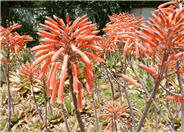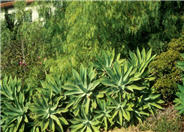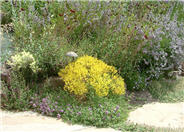
Common name:Pride Of Madeira
Botanical name:Echium candicans
Mature specimens of this evergreen shrub can grow to a size of 6'-8' tall and 8'-10' wide. In the spring, spikes of rosy-violet to blue-purple flowers appear. It should receive sun to part shade, with little or no summer watering when established. This plant can be severely damaged by frost below 25 degrees F.

Common name:Purple Tree Aeonium
Botanical name:Aeonium arboreum 'Zwartkop'
Aeonium arboreum 'Zwartkop' is a succulent perennial that is used for accenting effect. Aeonium arboreum grows 3' tall and wide. Each branch has a 6"-8 " wide rosette of dark green, fleshy leaves.The flowers are yellow in clusters.

Common name:Orchid or Purple Rockrose
Botanical name:Cistus X purpureus
Orchid rockrose is an evergreen shrub growing to 4' tall and wide, often shorter in stressful situations. The rosy-crimson flowers to 3" wide exhibit a dark purple blotch at the base of each petal, and bloom early to mid-summer. The flowers also feature a contrasting yellow cluster of stamens in the center. It does well in salt spray and cool winds. It is relatively long-lived, tolerant of heat and aridity as well as accepting many soil conditions.

Common name:Shrimp Pink Aloe
Botanical name:Aloe maculata
This succulent plant will grow about 2' high and has large, greenish/white leaves with orange, pink, and red flowers that bloom in spring and fall.

Common name:Mexican Bush Sage
Botanical name:Salvia leucantha
The Mexican Sage is a bushy shrub that grows 3'-4' tall and wide. It has hairy white stems, gray green leaves and velvet-like purple flower spikes that bloom summer through fall. This shrub tolerates sun, light shade, little water, and is hardy to 15 degrees F. The Mexican Sage is drought tolerant and attracts hummingbirds.

Common name:Aloe Vera or Medicinal Aloe
Botanical name:Aloe vera
The rosette of this plant consists of fleshy gray green leaves, which are narrow, succulent and erect with soft spines on margins. This Aloe is a slow to moderate grower. Flowers are spikes of yellow, 2'-3' tall and bloom late winter to summer. This aloe can form large clumps. It will tolerate full to partial sun, needs some supplemental water in heat and good drainage. It attracts hummingbirds. This aloe is a Mediterranean native. The sap is used for burns and abrasions.

Common name:Fox Tail Agave, Velvet Agave
Botanical name:Agave attenuata
This Agave has a dramatic tropical form. Even light frost can damage its succulent leaves. It is great for containers. In the low desert, partial sun will be best. If it becomes top heavy, simply cut and stick in the ground to root. It is not a fast grower and has light green foliage. It will also die after flowering but pups around the mother will survive. Distinctive with its large rosette of leaves perched on a long curving trunk, it is a native from Mexico.

Common name:Ferned-Leaved Tickseed
Botanical name:Bidens ferulifolia 'Goldmarie'
Tickseed grows 14'-18" tall. It is a heat tolerant variety that is perfect for cascading, bright color in baskets, containers, and window boxes. Finely divided foliage is covered with gold, single flowers. It blooms until first frost. Plant in full sun. It needs well-drained soi.

Common name:Mealy Cup Blue Sage
Botanical name:Salvia farinacea
This low growing perennial reach 1-1/2' x 1-1/2'. Bright green leaves are lighter underneath. Spiked blue-purple flowers bloom from late spring to fall. Attracts hummingbirds.

Common name:Hen and Chicks
Botanical name:Echeveria X 'Imbricata'
This succulent perennial is very small, growing only 2"-3" high. It produces orange, pink, and red blooms and does best in full sun and moist soil.

Common name:Mexican Palo Verde, Jerusalem Thorn
Botanical name:Parkinsonia aculeata
The Mexican Palo Verde has prickly stems. This tree is very fast growing with sparse foliage and very long narrow leaves. Yellow flowers with orange red throats bloom sporadically. It is very messy, thorny, weedy and short-lived. This tree is usually found on limestone soils in areas with moisture but is strongly drought tolerant. It can withstand saline conditions. It can be cold or drought deciduous. It is beautiful in form being light and airy looking, with green bark.
Dealing With Drought
More than half of the water used at your home is for outside purposes. Studies show that on average, half of the water used outdoors is wasted. The leading cause of waste is incorrectly set and poorly managed irrigation controllers. The second biggest cause of wastage is broken irrigation equipment that goes undetected. There are a few basic things you can do to make a big difference in your water use.
Click in the green box for more information
| Designer: The Plant Nerd | Too Much Fun |
Photographer: GardenSoft |
Soils and Compost:
Physical weed control, including mulching, or hand removal protects the watershed from harmful chemicals.
Integrated Pest Management:
Attract, or buy beneficial insects such as ladybugs and lacewings to control pest outbreaks in your garden.
